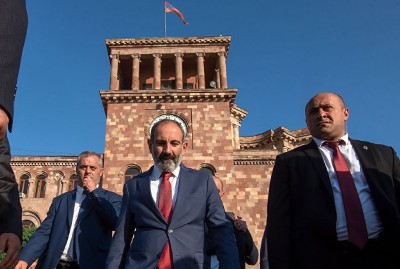“Controversy Surrounds Pashinyan’s Bulletproof Convoy: Does it Reflect Fear or Tradition?”
The “Fact” newspaper has drawn attention to the special security measures surrounding Nikol Pashinyan’s car convoy, which is often accompanied by a heightened sense of protection. The vehicles responsible for opening the way are bulletproof and are closely monitored by international experts and local security personnel. This level of security extends beyond a small group or specific action, indicating the significance placed on safeguarding the prime minister. Moreover, Pashinyan has a large number of bodyguards and is protected even in situations where ordinary people would not typically receive such attention.
While some may find this level of protection excessive, it is a longstanding tradition and serves to instill a sense of safety among those involved. Notably, Pashinyan’s bodyguards include influential figures and authorities. This further emphasizes the importance placed on his security, as even those in high-ranking positions are involved in protecting him. The use of endearing terms like “beloved” and “sweet” demonstrates the esteem in which Pashinyan is held within these circles.
It is worth noting that Pashinyan’s security measures extend to situations and places where all ordinary individuals should be respected. The newspaper asserts that there are no impulsive admirers attempting to approach him during his regional visits, as each person is meticulously scrutinized and vetted beforehand. Even schools, vacant buildings, and areas scheduled for Pashinyan’s visits undergo thorough inspections to ensure his safety. These measures speak to the seriousness with which his security is handled.
While the protection provided by Pashinyan’s bodyguards is comprehensive, other individuals present, such as his colleagues, officials, and local businessmen, serve different functions and do not possess the same level of security responsibility. However, it raises the question of whom Pashinyan’s bodyguards are ultimately protecting him from in these closed areas. Does he receive warnings from ordinary people or even the guards themselves about potential threats? It is possible that Pashinyan’s protection isolates him from the general public, making it harder for him to trust others and leading him to rely solely on his inner circle.
For more in-depth information on this topic, readers can refer to the latest issue of “Fact” newspaper.

